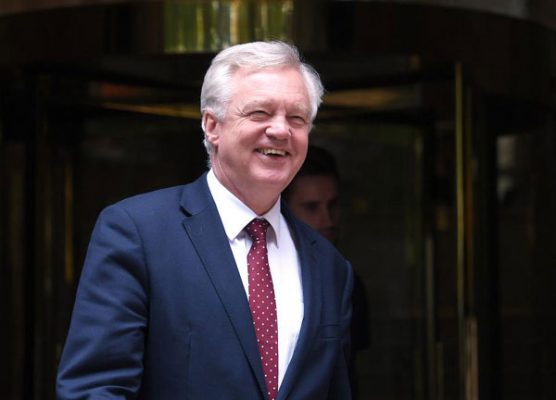
LONDON – The British government on Tuesday unveiled a blueprint setting out Britain’s future customs relationship with the European Union (EU), the first in a series of official document to outline the government’s Brexit strategy.
The paper puts forward a transitional customs arrangement between the United Kingdom (UK) and the EU, with customs requirements as frictionless as possible.
Although the paper does not indicate how long an interim arrangement will last for, British Brexit secretary David Davis told media here Tuesday that it would continue for two-years or less.
The proposal has to be agreed by the EU.
The British Department for Exiting the EU (DExEU) said the aim of the proposal is to continue some of the existing arrangements Britain already has with the EU.
It would, said DExEU, reduce or remove barriers to trade through new arrangements, and adopt technology-based solutions to make it easier for businesses to comply with customs procedures.
Britain is scheduled to leave the EU in March 2019 when it will cease to be a member of the European Single Market and the European Customs Union which allows tariff-free flow of goods throughout the 500-million population trading bloc.
Last year, British imports and exports from the EU totalled some 718 billion USdollars, said a government spokesman.
DExEU said a new customs partnership with the EU, by aligning Britain’s approach to the customs border, would remove the need for a UK-EU customs border.
One potential approach, the official statement said, would involve Britain mirroring the EU’s requirements for imports from the rest of the world where the final destination is the EU.
The paper published by the government is the first major proposal by Britain on its future trading relationship with the EU.
It is also the first of a series of papers on Britain’s future partnership with the EU.
The first paper also sets out new details on an interim period with the EU. The proposed model, which would mean close association with the EU customs union for a time-limited period, would ensure that UK businesses only have to adjust once to a new customs relationship.
This would minimize disruption and offering business a smooth and orderly transition, said DExEU.
Davis said: “The approaches we are setting out today will benefit both the EU and UK and avoid a cliff-edge for businesses and individuals on both sides.”
“The way we approach the movement of goods across our border will be a critical building block for our independent trade policy,” he said. “An interim period would mean businesses only need to adjust once to the new regime and would allow for a smooth and orderly transition.”
British chancellor of the exchequer, Philip Hammond said: “Our proposals are ambitious and set out arrangements that would allow British businesses to continue to trade with their European partners in the future, while expanding their markets beyond the EU.”
“In the near term, they will reassure people and companies that, the day after we leave the EU, they will still be able to go about their business without disruption as we make a smooth transition to our bright future outside the EU and deliver a Brexit that works for Britain,” he said.
The new document also tries to avoid any form of hard-border between Ireland and Northern Ireland and to establish an independent international trade policy.
The British international trade secretary Liam Fox said: “Leaving the Customs Union will allow us to operate a fully independent trade policy in Britain’s national interest which will benefit UK businesses and consumers.”
“We will seek a new customs arrangement that ensures that trade between the UK and the EU remains as frictionless as possible and allows us to forge new trade relationships with our partners in Europe and around the world,” he added.
The European Commission, the EU’s executive arms, said Tuesday that the paper release is a “positive step,” but it would “carefully study” the text.
“‘Frictionless trade’ is not possible outside the single market and customs union,” the European Commission warned.
Michel Barnier, the EU chief negotiator, also reiterated that talks on the future trade ties could not start until progress was made on other issues, including Britain’s exit bill.


